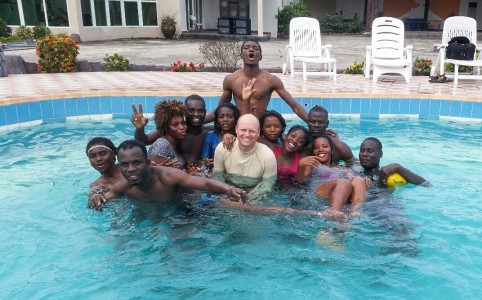Assistant swim coach Tim Hammond did not surprise anyone when he went to work at Challenging Heights, an NGO that works against child slavery, in Winneba, Ghana, to teach the staff in the organization swimming and rudimentary lifeguard rescue skills after receiving the 2014 Grinnell Staff Fellowship Award.
“Tim Hammond is a person who enjoys helping others,” said swimming and diving team head coach Erin Hurley. “He is very interested in experiencing other cultures and people with different backgrounds. He is also very passionate about human rights issues.”
What did surprise Hammond were the vast cultural differences he encountered in West Africa, especially the prevalence of child slavery in Lake Volta.
While functioning as a transportation and tourism site, Lake Volta is also the nation’s largest source of fish. And to increase profit margin from fishing, a cheaper labor force was introduced: children. Often physically and mentally abused and malnourished, many of these child slaves perform dangerous domestic labor, including fishing on Lake Volta without pay.
“Many of the child slaves in Ghana are taken to work on fishing boats, maybe [on] 30-foot canoes on Lake Volta,” Hammond said. “I am told this [is] a very dangerous lake due to the bottom changing and trees that are still standing from when it was flooded. Therefore, there is a risk of capsizing.”
Challenging Heights rescues those children, runs a school for the underprivileged and lobbies the government to promote enhancement of child welfare. James Kofi Annan, who established the organization after being a child slave for seven years himself, was awarded the Grinnell College Young Innovator for Social Justice Prize in 2011.
Three years after Annan was awarded for his efforts, Hammond decided to lend a hand. This past August, he hopped on the plane to head to Ghana.
But Hammond’s willingness to immediately make a difference did not come easily. Although Hammond and the staff at Challenging Heights shared the same goal of safely freeing child slaves, the Americans and Ghanaians shared vastly different cultural values.
“One thing I was often reminded [at Ghana] is that there are simple things every day that the Ghanaians assume I should know because it is such a mundane or simple, everyday part of their culture or daily routine,” Hammond said. “And yet, not knowing them really puts me in a situation [where] I don’t know how to function.”

Even during his work hours, Hammond encountered cultural differences that affected his method of teaching.
“I had to decide how I’m going to work within their culture and their infrastructure,” he said.
As more misunderstandings and the lack of fluent communications heightened the frustration, he realized that he needed to bend his personal philosophy and assimilate to the Ghanaian culture.
“I didn’t know anything about being there, so I was totally dependent on them,” Hammond said. “I immediately realized that I had to do whatever they are doing and I had to go along with whatever they are doing.”
As time passed and he began to understand and appreciate the contrasting culture, it was not just the 26 staff members at Challenging Heights who were learning from Hammond. The coach was discovering a new side of himself as well.
“I chose to wait for [my co-workers] and experience what they are doing,” he said. “I had concerns that maybe I wasn’t demanding it and driving the program and getting as much done as we can, but as I looked around the office and tried to understand what everybody else was working [on], from what I could see was, this was how it worked and I allowed that to happen.”
After returning to campus in mid-September, Hammond has resumed his role as an assistant coach, Natatorium Coordinator and Director of Intramurals.
“I was there to assist Challenging Heights and give them what they needed and also learn,” he said. “By sitting there and observing and experiencing what was going on, I was learning. This experience makes me more cognizant of when I am in other cultures and when I have someone visiting my culture.”

















































